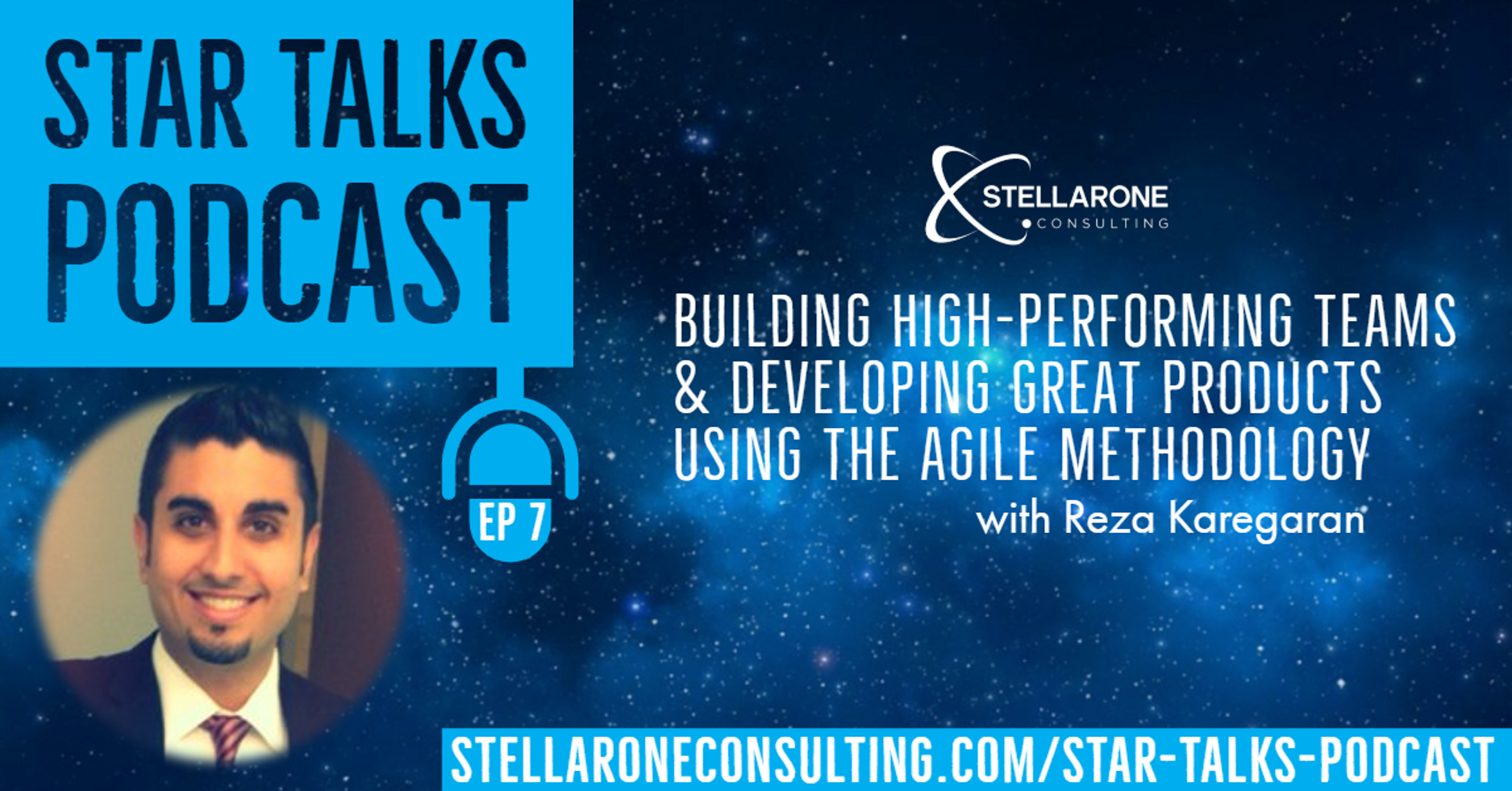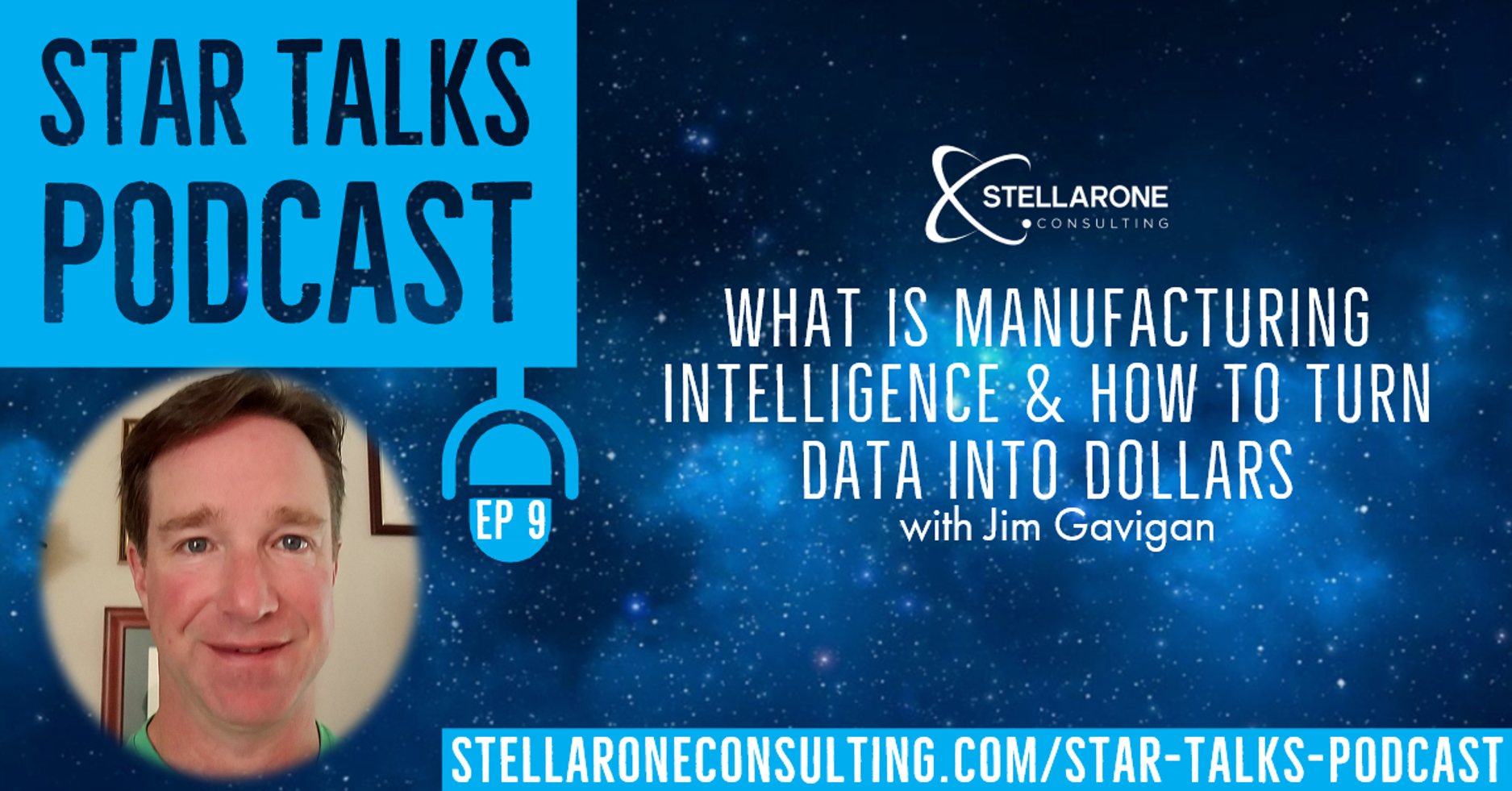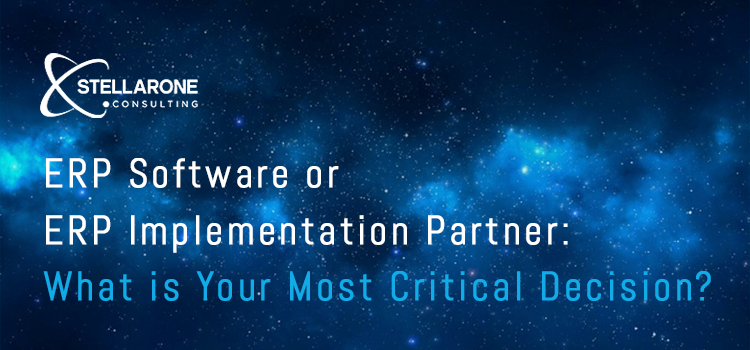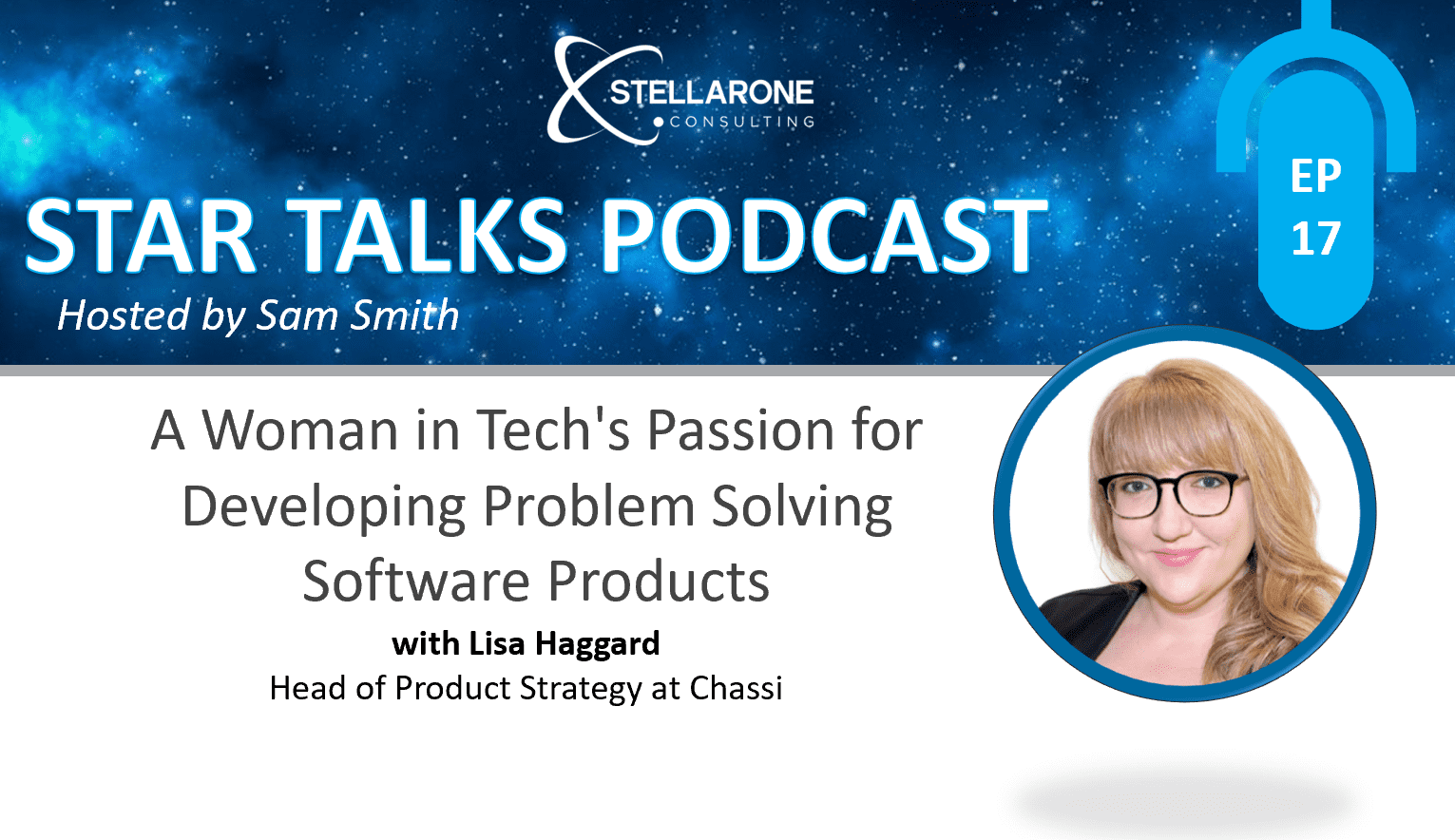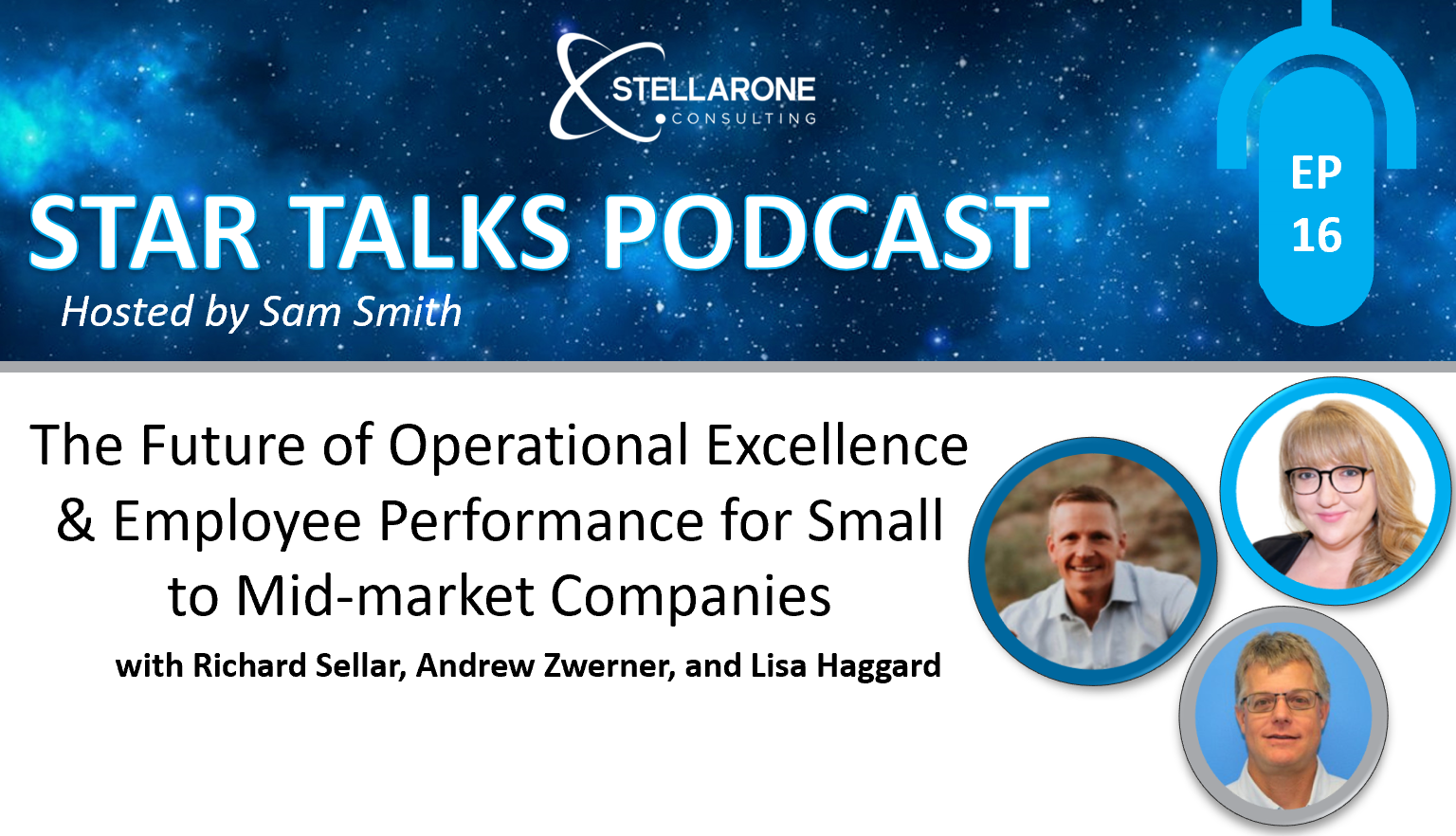Star Talks: Episode 8 with Luke Peters: Star Talks is the podcast of small conversations that inspire you to do big things and on this episode Luke Peters, the CEO & President NewAir Compact Appliances, the CEO of Retail Band, and Host of the Page 1 Podcast, talks about how he's been able to create and develop successful consumer electronics brands, how to navigate and overcome the challenges a brand faces when selling into big-box retailer eCommerce websites, and how to manage relationships with factories overseas and maintain profit margins during trade war times.
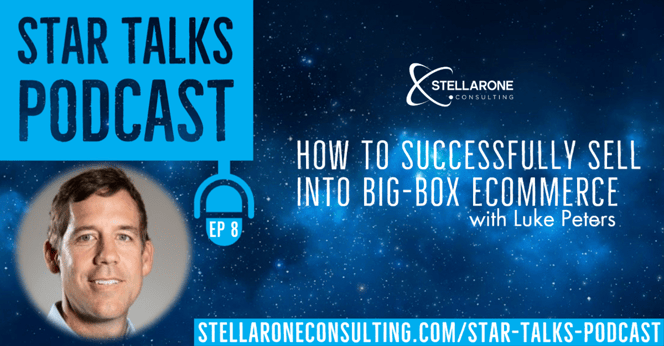
In this episode of Star Talks, Luke Peters sits down with us to talk about:
- How he's been able to build incredible teams in order to successfully design, develop and bring great consumer electronic products to market
- How to successfully sell on big-box retail eCommerce platforms, and how to leverage influencer marketing to launch new products
- How to maintain profit margins and manage relationships with overseas partners when your cost of goods can jump 25% overnight during trade wars
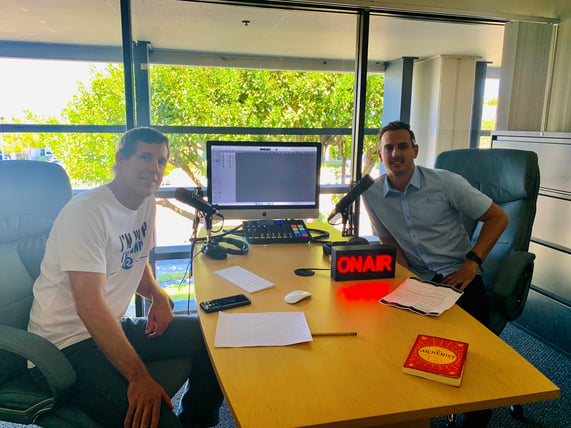
Listen, Subscribe and, if you like the show, give us a 5-Star Rating Here: Apple Podcasts | Spotify | Google Play
You can also listen to the episode with Luke here:
Ways to connect with Luke and the Stellar One Team:
Luke Peters - LinkedIn | NewAir Compact Appliances | Retail Band | Page 1 Podcast
See all Episodes here - Star Talks Podcast
Stellar One Consulting Social Media - Facebook | LinkedIn | Twitter
Sam Smith (Episode Host): LinkedIn
Here's the episode transcript:
Luke, thank you so much for uh, for doing this. Thrilled to be here. Looking forward to it. Cool. To have you here, uh, in person. Yeah. So, uh, just so that our audience knows that's listening. Uh, we are in the New Air's studios right now. Um, so we elected to do that recording on there. Really nice setup here. So, uh, Luke's is a, uh, podcast aficionado now and he's got the nice set up here. So here we are.
Luke:01:46
I'm learning, I'm learning that we got the nice setup and then I'm trying to become the aficionados, but it's fun to have it.
Cool man. Well, again. Yeah, thanks for hosting us. So you're self-made entrepreneur. What, what was it like growing up? What, what about your upbringing contributed to you taking this path?
Luke:02:03
Yeah, well, so we always had a job when I was growing up, we had a donut shop, so we had a big family and had a donut shop and I was making donuts in the middle of the night and, and I would literally go into school with a bag of donuts that I would trade for lunches. So my parents were, you know, we had to make our breakfast and make our lunch or earn our lunch. And, uh, had donuts around the house day and night and that, that's kind of how we were raised and had newspaper routes and all that kind of stuff.
Oh wow. So, um, so that was kind of a thrust on you from the beginning. Your, your parents were entrepreneurs. Yup. Awesome. So you've taken an interesting path. Your first company that you started. Tell us what was that all about?
Luke:02:41
Sure. So going back, so I had, um, a newspaper route, then I started a pool business, actually swimming pool service. So that's how I paid for college. So for about four years, five years, I was um, you know, driving around in a tank top and cleaning swimming pools and after graduated college, sold that business to a friend who still runs it. Right now it's called pool heaven. So out of orange County, he's very successful and they've got a great company. And, um, and then after that I went to work as a hazard voice scientist and then started this company, which is kind of several different brands and companies along the way. Uh, in 2001, after working as a scientist and then kind of saw my little brother doing really well online, started this company kind of burning the midnight oil. And, uh, probably within six months it was already taken off really fast and, and uh, kind of just took it from there.
So you saw your brother, he was killing it online and you said, why can't, why can't I do it either?
Luke:03:38
Yeah, pretty much. So he didn't, he didn't even finish college. He was driving a nice car and I'm driving a beat up truck into, uh, from Huntington beach to Glendale, which is probably like 48 miles or 45 miles, but it could be two hours. And, um, and he was selling computer electronic parts. So I did a search during summer to find, I had no idea about anything online. He didn't know anything about SEO, didn't know anything about how to buy a product or who to buy a product from. And um, so I just did a search on Yahoo or not even did a search, just looked on Yahoo homepage and at the bottom, portable air conditioners. It was listed as the number three search term at that time and period.
Luke:04:17
So I'm like, Oh, I should find out what these things are. And uh, and then just started looking for portable air conditioners. And actually funny part of the story is the company, the first company I bought though. So I started buying stuff from Granger and reselling it and Granger's a huge company. Right. And, uh, and the other company I will I worked with was a company called soleus. They're still around right now and we're good friends with them. We play a yearly basketball game against these guys every single year. We just played it about a month ago and I started buying an air conditioner from them called the KY-32. And so I always joke when I meet up at the soleus guys cause we were like, that's kind of how, uh, you know, the new air started.
Wow, so you really had no background in air conditioning, any appliances, you literally just went on Yahoo, saw what the search terms were, the most recent or most search terms were, and you said, why not go for it?
Luke:05:10
Yeah, pretty much. I didn't know anything about it. I mean, I knew how to fix things. Not that there was any fixing involved here, but like growing up, you know, I worked on cars, you know, built in engines and, and uh, and then as a, as a pool guy, you know, you kinda had to fix the pool equipment. So I was, you know, pretty handy when it came to. And so usually your attitude when you have that kind of business is you just figure stuff out, something breaks, you gotta go figure it out. So it's the same thing here. I just had to figure out how to sell it online.
So taking a step back, so you grew up in this area, so we're in Southern California and you, this is born and raised. . .
Luke:05:41
uh, yup. Fount Valley. All right. So, uh, I, you know, just so our audience knows there is a hat in here that said, make, make surfing great again. What's all, what's that all about? Yeah, well it's, we definitely, it's not meant to imply anything about terrorists, so it was just kind of a, it's just kind of a play on the, on the a hat and uh, yeah, surf grip surfing with a bunch of my friends and we still get together a lot.
Awesome. Yeah, I surf as well. Um, so how did new era, how did you get to where new air is at today? I mean, I'm in your office, your facilities here are massive. What's the journey like? How did, how did you get to this point?
Luke:06:16
Yeah, I mean, long story in a lot of challenges along the way. Trust me, it's, it's never easy, but, uh, but it's a lot of fun. It's very rewarding. So I would say, I will say quickly, here's the, the one minute story is we started out as a direct to consumer selling e-commerce. Okay. So just reselling other people's products and then started building our brand along with that. And then in like 2012, 2013 is when, um, we made a big change where we focus just on our brand. So for the first 10 years, it was a direct to consumer, 2012, 2013, we focused right on the brand and kind of a wholesale model where our brand is being sold to retailers who then are selling the product. Uh, from a marketing perspective, they've got all the eyeballs, you know what I mean? They're, they know how to kind of have better customer retention than we do.
Luke:07:01
Um, lower customer acquisition costs, so on and so forth. And for us it is a eCommerce company. It's always the most expensive one. So it, from a model perspective, it makes a lot of sense. We still do direct to consumer right now, but a bigger portion is going through all of these wholesalers. So along the way it was that big pivot in 2012, 2013 grow our wholesale business, really build out the brand, build out, you know, great teams here at new air sales and in marketing and HR and logistics ops, accounting, supply chain and every, and just kind of building the team honestly. And then so you have, you have a new strategy, which is, you know, bringing great product, develop awesome fun products, and then, uh, partner with these big retail partners. And then behind that you execute by just having the best team in place.
Yeah. So from a, so B2B, so in 2012, 2013, you, you went away from doing your own products or that focus there and focused on the wholesale or how did that, how'd you, how'd you juggle that?
Luke:08:04
We did is we went from focusing on selling our own product, direct to consumer to working with these retailers, selling our product to them. They're finding the end customer. Got it. So, but it was all focused on our product, right. At that time we stopped selling all these other brands. We were selling at one point, probably like 400 other brands. And we pulled away from that, you know, just to focus on our brand, build our brand better margins and just build a business around Newark.
So, um, this cigar humidor that you've developed is that, that's part of, uh, the new air brand?
Luke:08:38
Yup. Yup. Absolutely. So, um, some really fun cigar humidors wine coolers, beverage coolers, uh, portable ice makers, air conditioners, evaporative coolers, misting fans, all kinds of other cool products.
So how is, uh, we, I mean, we can get into a couple of things, are a little bit down the line, but how is it that you're able to create and develop a product and bring it to market in, in a market that seems to be fairly congested with some of these big names? What is the, what's the big what . . .
Luke:09:11
well, there's a lot of them like exactly in Samsung and all those big guys, but the thing is they often play in the full size space and we're in the compact space. Okay. So it's a good category. There's still tons of competition and tons of price competitive competition. Um, but it, you know, once, the thing is when you're smaller, it can be harder. And then we're, you know, we're still only 50 people, so we're not big, but we're at that point where we can have really strong relationships with our factories. So once you get to a certain scale, you're important to the factory. And so you are, you have all the competitive advantages that most other brands are going to have at the product level. So then it's about just having the best team, making sure you're executing on the sales and marketing side.
Okay, so new air, lot of success. You guys are creating your own products, selling them wholesale, you're blowing out your eCommerce business and you're having a ton of success. You've learned a lot. And then you opened up our commerce agency, retail band. What is our commerce and what's retail band all about?
Luke:10:15
Sure. So our commerce, well we call that retail commerce, but how, how we differentiate that is everybody's thinking of e-commerce selling directly or they're thinking of Amazon or they think of in store. But most people aren't talking about all the sales that are happening on all of these big box retailers. And that's how, that's the phrase that we are defining that. So it's kind of a, it's, it's not often talk, uh, not often talked about, um, portion of the, of, of the business out there online. That's happening on home Depot and Lowe's and Wayfair, Walmart, all of these great brands, target best buy and we are really good in selling into those brands and understand kind of the SEO behind the, uh, all the different portals and how each one is individually works different from others. So we're able to provide a really white glove service for other, um, brands that don't know how to sell. So maybe there's so, and I just to give you an idea, somebody who we would help would be somebody who if they've got a good brand but they sell it in store but they don't know what they're doing online. Okay. Or a brand where they sell into Amazon and they're not selling to home Depot for some reason cause you know, they don't know how to, or they're too busy. So we'll take them in, take them into these other channels and help them become successful.
So selling into big box retailers, like what is, what is a challenge that a company would have that maybe they wouldn't expect? Is it in the supply chain, is it in sales and marketing, is it in the operation itself? And you know, running and knowing your metrics and the customer service department and making sure your cost per acquisition is, are down to what is the challenges that are, what is a challenge that maybe someone wouldn't expect?
Luke:12:58
And then specifically, so what were the retail band? Um, what we're talking about is selling online into those channels. Okay, so little different cause there's a ton of challenges in store by the way. So this is a whole nother set of problems. So are usually what happens is, um, the number one thing is most of those, uh, most of these sites we're talking about, all the ones that I listed are not that easy to sell into that. That's the main thing. They're not like Amazon where anybody can go in and just list it. You don't need anybody's help. You don't need anybody to literally approve your product. You have access to all of a, a portal that's um, that makes it easy and self-serve for you to do stuff. Whereas on these portals, there's often approvals needed by buyers. So there's another human interaction at the other end.
Luke:13:38
And in some of them there's multiple portals, so multiple areas online you need to log in to maybe put in your product information. And then another one that may be you have to put in other stuff and there's, or get information from. It's not as streamlined as Amazon. So what happens is, since the sales volume often isn't, isn't often isn't as high as Amazon, people are ignoring them, you know, or they're not optimizing them. They'll just list it and that's it. And usually when they list it, they're not taking an advantage. They don't realize that there's advertising you could do on the portal. That's a big one. Um, they're not taking advantage of the understanding the SEO. So usually they're just like, you would understand SEO on Google or they'll all go look at an Amazon listing and they put all this time into it and thought about the title and the same listing on wafer or home Depot has like five words in two pictures, you know, so they're not [inaudible]. So they did understand that on Amazon, in order to rank, you gotta use all of these key words, but for whatever reason that's not applying to whoever's running these other accounts. And it, it's the same thing except it's trickier because what works on one of a may not work on the other. So you kind of have to know the different nuances between the accounts.
So like what are some of the factors, like, like description, product description, tags, the actual name of the product, or what are some of the factors that contribute?
Luke:14:52
Sure. So every site will be different. But factors that'll be contribute would be do they, are they carrying your product, do they have your product in stock or are you shipping for them? That's a big one. Um, and every retailer is different about how to do that. So make it easy. Some have distribution systems, like you know, uh, Wayfair has something called castle gate. So you can put your product into castle gate when that's in there, that's probably gonna help with your sort ranking and so on and so forth because your clothes more closely aligned with them. They know 100%. They have the inventory plus the next one would be are you getting a two day shipping badge? So if you're in there DC, you're going to get that two day badge.
Luke:15:30
If you're just shipping from your warehouse like we would here in California, we're not going to get that to somebody in New York. Um, a lot of them will have, um, internal, um, advertising platforms. That's going to help because that's gonna push your paid listing. But then you're going to get more sales on that. And so your organic listings are probably going to start going up, right, cause you're gonna get more velocity on that skew. So sales velocity is always a big ranking factor. Um, content, content quality, lifestyle images, probably smaller ranking factors, but maybe, maybe smaller sort ranking. But they'll help you show up in multiple searches, right? If you have the right keywords in there. Um, you know, and then there's, there's a couple of others, but those are probably the, some of the high points.
So let's say you're a new brand new company and, uh, what are, you know, you've got limited bandwidth obviously. What are some up and coming platforms that maybe they could, they could go to and not have as much competition and maybe have a better opportunity to gain some traction quicker?
Luke:16:17
Yeah. Well, of course everybody wants to start an Amazon, which is fine. And then depending on, I mean, if you're like in the home improvement category, definitely get on the home Depot, Walmart, Wayfair, Lowe's. Um, home Depot is great partner to work with. Wayfair's an incredible partner. So those are probably some top places I'd start.
And where, what's the barrier entry there? Like what's required?
Luke:16:48
I mean different things with all of them. First of all, they kind of, you know, they're there, you gotta get a contract signed and there's an approval process and kind of a terms that you know that they are pretty much going to give to you. And that's the main barrier. So it's different because they're not just obviously they want to evaluate the partners they want to work with. So like I said, it's different than Amazon. We're pretty much anybody can get on and get a seller account or like an eBay. So with these you're going to have to get approved. I guess that would be the barrier to entry. They're going to look at your business and say, you know, do we need to and want to partner with you?
The products like this cigar humidor that you've developed, like how from start to finish, I guess there's probably phases that you go through, but how is it that you design a product, figure out what the market needs, design it and have it developed and then bring it to market. What are the different phases that are involved there?
Luke:17:43
Yeah, good question. So first it starts with understanding the market. So you do you understand the market, you see, okay, is this product going to be successful? Um, marketing team will some market research on that and probably use a number of tools. I know like on Amazon you can use jungle scout or tools like that to kind of go say what's the search volume or potential sales volume on a skew. And you can, you know, apply that in a relative manner across other channels. So whatever your favorite way to kind of look at a category and see if the sales make sense. But then you have to look at the competition and for us we have to make sure it kind of aligns with the brand and that it's going to work. So for us, beer, wine and so cigars kind of made sense to put that in there. So that would be step one. So then you decide on, it's an then you go look for a partner.
Luke:18:21
So for us, it was one of our existing factory partners with somebody that we could work with. So we brought the product to market and that first version probably like, I dunno, five years ago or six years ago or something. And then you learn if, how the reviews are, what customers are saying about it. Of course before you bring it, you're doing your own testing, but you really don't learn as much until you go out and get into the market. And then you get feedback. And actually the funny thing is on the cigars, the reason we knew it was a good industry was people were taking our wine coolers, pulling the shelves out of them, putting in Spanish Cedar wood shelves and calling it a wine adore and wine adore became a really hot search term. So we've, we're, we're like, well, people are doing this themselves out of our wine coolers.
Luke:19:02
So then we found a local, um, a local wood guy and he was actually making the shelves for us here. So he'd come and make custom shelves. We would bring in one of our wine coolers, pull out all the metal shells, put his cool wood shelves in and ship it to a customer. So we would do that for a number of years. And then then we actually got these made you know exactly for this purpose. So that's takes you kind of along the journey. And it is an interesting one because the one you pick to ask, how's that interesting thing about the customer, about literally us seen blogs of people taking our wine coolers and turning them into wine adores, which is pretty cool to see. So then so then the newer change that we have recently as we is customers were complaining and cold areas because this thing would just cool the temperature cause that's usually the problem to be solved. But if it was in their garage it couldn't heat it back up cause you want to stay about 70 degrees. So then we, we now have one with the uh, heating function, which is pretty cool. So it can go both, both directions. And then to top it off, a department of energy has new regulations. And so now we're having to totally remake them all to meet the DOE regulations.
Oh great. So it never ends. So there's a couple of different things that I wanted to talk about. They're both there and they're on different spectrums or ends of the business process. The first is, you know, in your last episode of your podcast, you talked about the tariffs and you talked about ways that these businesses can go out and try to figure out how to compete with this and make sure that they're in business in a couple of years, assuming that they don't go away. So you talk about going to the factory and trying to negotiate better terms. What are, what are some of the first steps that people can take to, you know, go not direction and to make sure that they are going to be able to withstand these tariffs assuming, you know, cause you have to assume that they are not going to go away.
Luke:20:48
Yeah, I mean look, it's man, I wish we were doing a better job. It's a, it's a tough one for every company out there. So right now it's a, it's a challenging, the most challenging business environment probably any of the companies in our area have ever faced or maybe ever will because just overnight you have a set margin and all of a sudden you have a 25% cost of goods expense put on that. Most of the retailers aren't taking it. Uh, you're having to make choices of pulling product or not pulling product and, and it's, it just creates a lot of friction. So it's, I mean, definitely, I just want to start by saying I'm not an expert. I mean we, we know what we're doing and, and, and talk to so many friends about it.
Luke:21:31
Um, our particular challenges that we are in that 25% category already were, a lot of people are not yet, maybe they're in the 10 maybe they're going to be in the 10 maybe they're going to be in the 15. There's like the different phases at this thing has come in. So we're already significantly hit. And what you can do is, is you basically, I think, I, I think in that one podcast I had on tariffs, you know, I kind of talked about the different, um, areas you can look to get most of it back. So how it would look is you'd go to your factory and obviously negotiate something there. So the RMB has moved a little bit. It's not going to be enough, but you, you know, you should be able to get, you know, three to 10% from your factory depending on the RMB and everything else.
Luke:22:09
But getting 10 is not as easy as everybody makes it seem. So all, all of your customers are like, well, don't give us a price increase, just go to your factory. That's usually not how it works, especially with this key caveat, assuming you've been negotiating all the way. So most people already have a good price with their factory cause they've already been with them for many years and negotiated a good price. So there's not a lot of, of, uh, you know, meat left on the bone right there. So that's the first place. And then you're going to go to your supply chain. So, um, we've gone out and done really good on the supply chain, meaning ocean freight and all the things involve from port to port and um, port to dock. So make sure that you understand what there's so much involved there on the freight side that you can look to cut out additional small costs. Um, so between that, so you got some, let's say you're able to get, just to make it easy, you're able to get like 5% of the factory, then you get 1%. I add at your supply chain, maybe you could do better, but we'll call it 2%. So you're at seven. Cause I think for a lot of companies you can actually do better on the supply chain. Then they think then you bring it in and you need to put in a wholesale, um, increase of let's say you know, 10% on your wholesale price to your retailer. It's really hard to get that. You're probably not going to get it on every single skew that goes across that line, but you'll get it on some of them. So you're gonna have a blended increase and you add up the 7% reduction you got at the beginning there.
Luke:23:35
And that's kind of more at a cog level. And then at a wholesale level, a you know, 7% blended increase, which is really could be like a 12 or 13 the cog and you're, you're getting close to the 25 but you're not going to be there. So hopefully I'll, I rambled a lot about the different ends of it, but you kind of just add up the percentages and it's hard to, in this, you're going to have to, you know, do some other additional company a cost-cutting.
Right? Absolutely. And at the end of the day it ends up translating down to the consumer. I pay a higher price for the product. Right? [Yeah, exactly.] So that's pretty interesting. So another thing that you talk a lot about is influencer marketing. I think that might be fairly confusing or an ambiguous thing that people are trying to wrap their heads around. How have you, how have you been able to be successful doing influencer marketing and, um, how has it affect, I guess, how has it affected your ability to sell more product?
Luke:24:23
Yeah, no, it's, well, what it is is it's, it's selling more product, but it's also getting reviews on your product and launching the product. So basically it's part of the system of, of launching skews over here. And we do the same thing for retail band customers. So we can offer that service and it's really effective on new product launches because what you do is you bring your product and you have no reviews on that skew. And then hopefully on your direct to consumer, you're set up with a, uh, a review syndication platform that's going to syndicate reviews out to home Depot, out to Walmart, out to wafer. You see, so you're not having to get reviews individually on those sites.
Luke:25:07
You just get them all on your direct to consumer. They all go out and syndicate out. Of course additional reviews will come in on those platforms as you sell more. But what that means is you bring an inventory and within 30 days, because you ran an influencer marketing program, so because you send out like 30 samples to the best influencers, you get all these videos, all this Instagram content and all these reviews, those reviews are then immediately go into your product. And then it take about a month or so to syndicate out to the different retailers. So right off the bat you've got product with reviews. So now you can start hopefully doing all those things we talked about earlier and getting sales and rankings on those products.
So that's really, I mean, if you go into this with a product and you bring in here to sell it and you don't do that, I mean, what are the, I mean, what's the difference between doing it and not doing it?
Luke:25:58
Yeah. So most people, if they don't do it, they're waiting forever to get reviews. Right? So, you know, and then, and then what they're doing is they might be spending ad dollars, but you're, you're directing traffic and it's just like bouncing off your product because your product doesn't have any reviews. So this, it's really important at the beginning, we just, we call it the 10 day launch plan, you know, all in these 10 days, there's like a series of things that we do over here to make sure that that product is effectively launched.
Okay, cool. So before I get into the last question, I ask every guest, what if someone wants to get in contact with you and they want to talk to you? What's the best way to do that?
Luke:26:34
Yep. Great. Thanks for asking. So a find me on LinkedIn, I'm happy to help out in any way I can. And uh, especially with retail band, if you're a, somebody who sells a consumer electronic or consumer product and you're in any of those retailers, we can utilize all this knowledge and experience we have to help you out.
Awesome. So again, I do ask this with every guest. What is the most rewarding thing about what you do?
Luke:26:55
Yeah, I mean it's, it definitely is working with the people. You know, we just, actually just before you came over, we were having a, a just a funny meeting cause the guys were going to have some of the teams go into China. So we were having a lunch meeting and just going over the goals and um, it's just a good time, you know, cause then all the funny stories from their last trip to China come up and, and uh, everybody can kind of reminisce about the fun events or, um, or what might happen on their next trip to China. And there's always something crazy that happens. So, so just, you know, the comradery in the, in the team that we built over here, it's, it's a special team. So, um, definitely very rewarding.
That's awesome man. Well, I can tell you from the time I hit the parking lot through the lobby and up here, it seems like you've got a great culture and you're doing a really special thing here. So I really appreciate you hosting me.
If you'd like to suggest a guest, be a guest yourself, or if you have something to say, leave a comment below or send your message to StarTalks@StellarOneConsulting.com.

